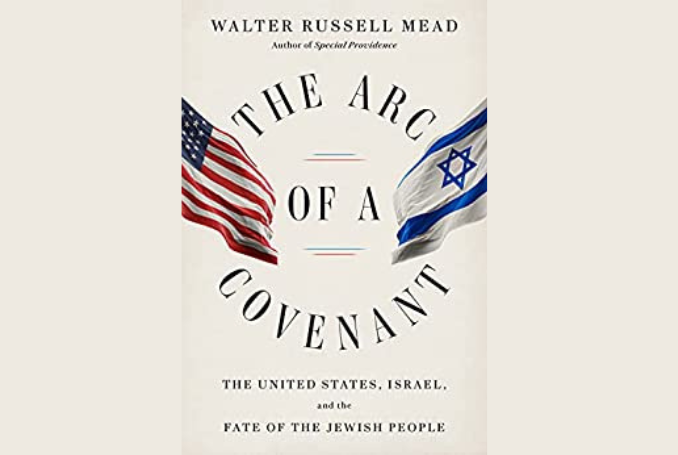
By Jim Miles
(The Arc of a Covenant: The United States, Israel, and the Fate of the Jewish People. Walter Russell Mead. Alfred A Knopf, New York, 2022.)
In today’s world, a clear understanding of the relationship between the US and Israel is important – this is not the work to clear it up. Walter Mead’s hypothesis is that Israel does not control US governance, but that many other forces have shaped the relationship. With that, he is correct and in an overly long convoluted manner he is able to make that sort of clear. “The Arc of the Covenant,” for the arguments presented could have been well worked in half of its almost six hundred pages.
Instead, the book is a mix of theology, sociology, geopolitics, domestic politics, history, and biographical analysis of – mostly – various presidents of the US It really succeeds with none of them. It contains far too much theorizing and conjecture, discusses at length beliefs and morals, and has far too many unanswered rhetorical questions (okay, rhetorical questions really seek no answer, but there are far too many of them). The reader will not come away with a good understanding of Israel as the vast majority of the discussion is centered on US political maneuvering.
To his credit Mead is quite critical of many US failures around the world but mostly in the Middle East. Unfortunately that comes from a perspective, unstated but implied, that the US is the indispensable nation and acts with good intentions because of its moral strength and liberal beliefs. He does use “exceptionalism” frequently, implied or directly, giving support to the thought that Mead, without stating it directly, is a firm believer in the US being the world’s global policeman, “by the courageous use of necessary force.”
Omissions
There are far too many problems with the arguments presented in this work to counter them here, but it is what is missing that makes the arguments so weak.
While he discusses “national interests” and the ability of the US to use force to maintain peace (a lot of an oxymoron) he never discusses the US as an empire. Certainly the evil Russians and Chinese, and before World War I the Germans, Russian, and Ottomans were all the cause of that war as contending empires. British, French, Dutch, and other European empires are mentioned in passing, but he does not accept, or will not articulate, that the US is the largest empire the world has seen – militarily and economically, the two going hand in glove.
The massive 750 military bases around the world, mostly surrounding Russia and China, and that ability to use the global reserve currency, the petro-dollar (never mentioned in the book although oil is continually mentioned as a strategic value) and its associated institutions (WTO, BIS, World Bank, SWIFT et al) to impose destructive sanctions on countries that do not abide by its wishes is the modern form of imperialism.
He reiterates several times the US role in decolonization without recognition that it was the US that denied Vietnam its fair and democratic elections, denied Korea the right to vote for its post war government, created the CIA with its initial successes overthrowing governments in Iran and Guatemala in 1953. He admits US errors in Iraq, Libya, and – well not quite Syria, it was the “brutal” Russians that destroyed Syria, even while US forces remain in large parts of the country to this day. There is no mention of Operation Gladio, the occupation of Japan and Germany that continues today, nor the seemingly endless list of interventions to overthrow unfriendly regimes either through economic or military power.
Israel
When it comes to discussing Israel there are equally large omissions. A reasonable essay on Herzl’s machinations is given, but after that, he generally uses only passing mention of Israel’s settlements and the wall as the main components of Palestinian strife. He accepts that some people think of Israel as a “colonial-settler” enterprise but dismisses that thought as being on the radical left and of little importance.
He dismisses the idea that Israel is a racist (actually he never mentions that with Israel) and an apartheid state. The book is recent enough that the author is surely aware of the major institutional labels of Israel as apartheid, including Israel’s own B’etselem.
Nor does he get into the details of the ethnic cleansing and genocide of the Palestinian people as an ongoing process. The many discriminatory laws and policies, house destructions, the imprisonment, and the torture as an everyday occurrence of Palestinian life are never considered.
At the same time, Mead does not create a coherent history of Israel. In his concluding remarks Mead states, “….for both Israelis and Palestinians, two peoples whose fates have become intertwined in ways that neither side wanted or foresaw.” This is absolutely not true, as Jabotinsky, Herzl, Weismann, Ben Gurion and others – including most of the British political establishment – knew that depositing Jewish immigrants on land owned by Palestinians was a source of major problems as obviously the Palestinians recognized it as well.
He continues with “their private quarrel must be fought out in the glare of global publicity.” That at least is good news, as the balance of power, out of sight of global publicity, hugely puts Israel in a dominating position.
Finally he concludes “I have tried to shine a useful light on the relationship between the ways Americans think about the world and the approaches they develop to act in it.” Mission not accomplished as per the errors and omissions mentioned above among many others.
Current Events
“The Arc of a Covenant” was published shortly before the Russian invasion in Ukraine to prevent the ongoing shelling of the Donbas people by Ukrainian forces. Since then, it is clearly demonstrated that the “prime directive” (p. 13) of the US empire is the destruction of the Russian state and the containment of the power of China.
We are entering a new era where “the ways American think about the world and the approaches they develop to act in it” are clearly global dominance through financial and military means. All the purported values and morals are worthless when the true history of US imperial adventures are understood.

– Jim Miles is a Canadian educator and a regular contributor/columnist of opinion pieces and book reviews to Palestine Chronicles. His interest in this topic stems originally from an environmental perspective, which encompasses the militarization and economic subjugation of the global community and its commodification by corporate governance and by the American government.







